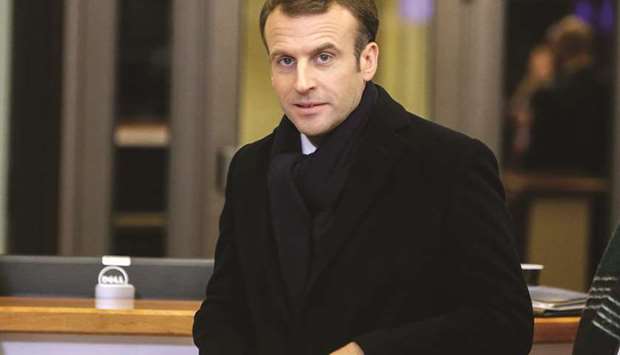French President Emmanuel Macron has called off a planned visit to the south of France in order to kick-start a major public debate he promised in response to the Yellow Vest protest movement, a source in the Elysee Palace said Monday.
Macron has cancelled the Tuesday visit to Biarritz, where he was expected to discuss the G7 summit France will host there next year, in order to hold talks with ministers about the public debate, the source said.
The protests started in opposition to planned fuel tax rises - since cancelled - but has since raised a wider range of demands.
Thousands of protesters took to the streets again across France on Saturday.
Their numbers were, however, sharply down on previous weeks, according to officials. In Paris, protests went off largely calmly, after violent clashes with police on previous Saturdays.
Macron has also promised a 100-euro (113-dollar) rise for low-paid workers and tax breaks on overtime payments, end of year bonuses and some pensions.
Prime Minister Edouard Philippe on Sunday confirmed that the total cost of the concessions would be about 10 billion euros.
A series of tax measures and cuts to public spending would recoup about 4 billion euros of that cost, Philippe told business newspaper Les Echos.
The government intended to cut 1 to 1.5 billion euros of public spending, as well as saving 1.8 billion euros by delaying planned cuts to corporate taxes, Philippe said.
Another 500 million would come from a new tax on major digital economy firms, the premier said, confirming that France planned to put its own tax in place ahead of any agreement at European level.
The overall impact would bring France's budget deficit in 2019 to 3.2 per cent of gross domestic product (GDP), the premier said - back over the EU's official ceiling of 3 per cent which Macron had previously insisted on sticking to.
France got its deficit below 3 per cent last year for the first time since before the global economic crisis of 2008. As a result, in June the EU ended a disciplinary procedure over excessive deficits launched against Paris in 2009.
But French ministers have said the deficit hike will be for one year only, as next year's deficit figure includes 0.9 percentage points attributable to a one-off change in employers' social charges.
Philippe rejected any comparison with neighbouring Italy, whose populist government recently backed down in a row with the European Commission over plans to raise its deficit to 2.4 per cent in an expansionary budget.
Italy's public debt, at more than 130 per cent of GDP, is much higher than France's, at just under 100 per cent, although both are well over the EU target figure of 60 per cent.
‘Our plans are very consistent, unlike the ideas proposed by the various parties in the Italian government,’ Philippe argued. ‘We are going to continue modernizing the country with important reforms such as [those to] unemployment insurance, the public service and pensions.’

